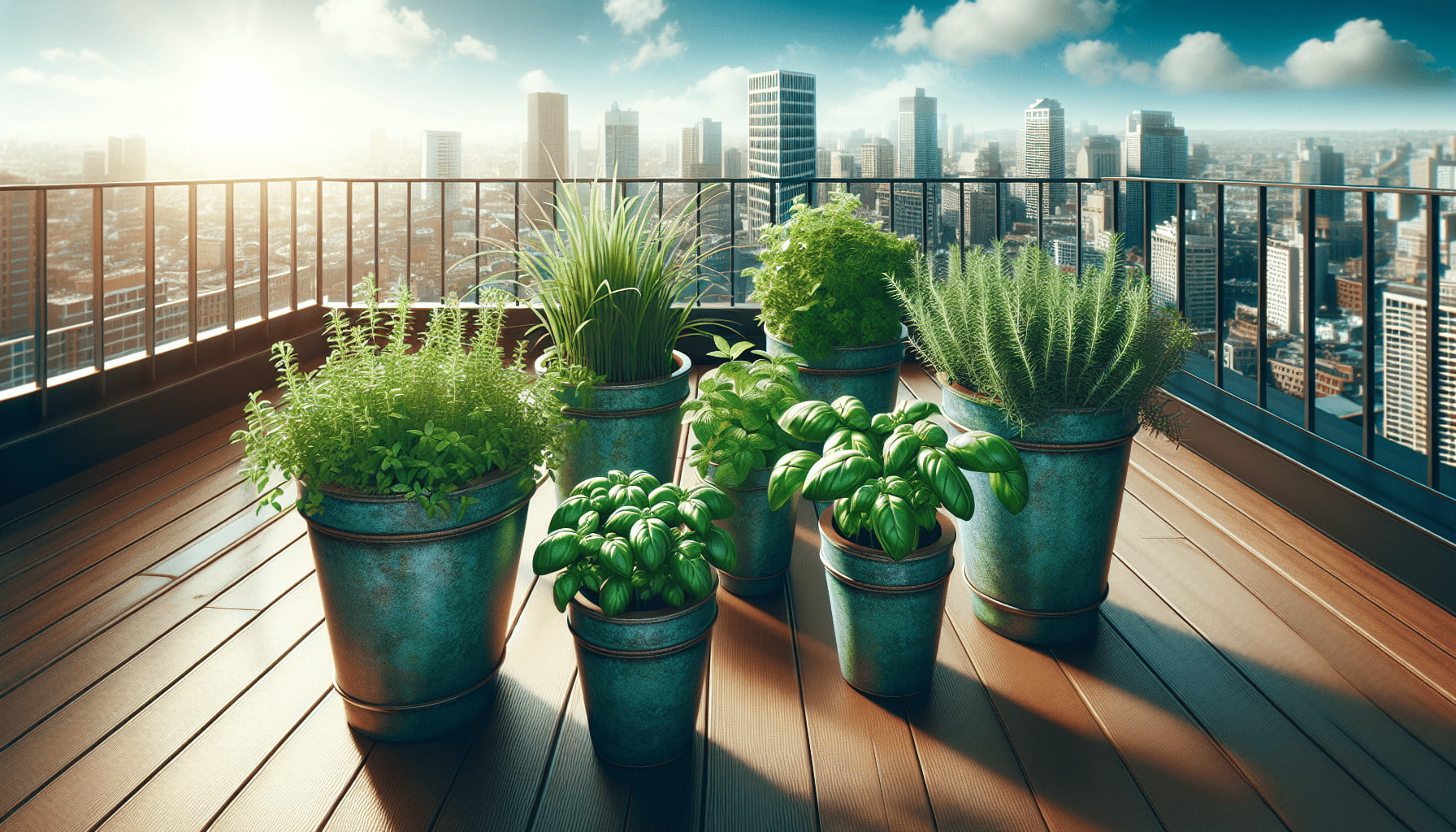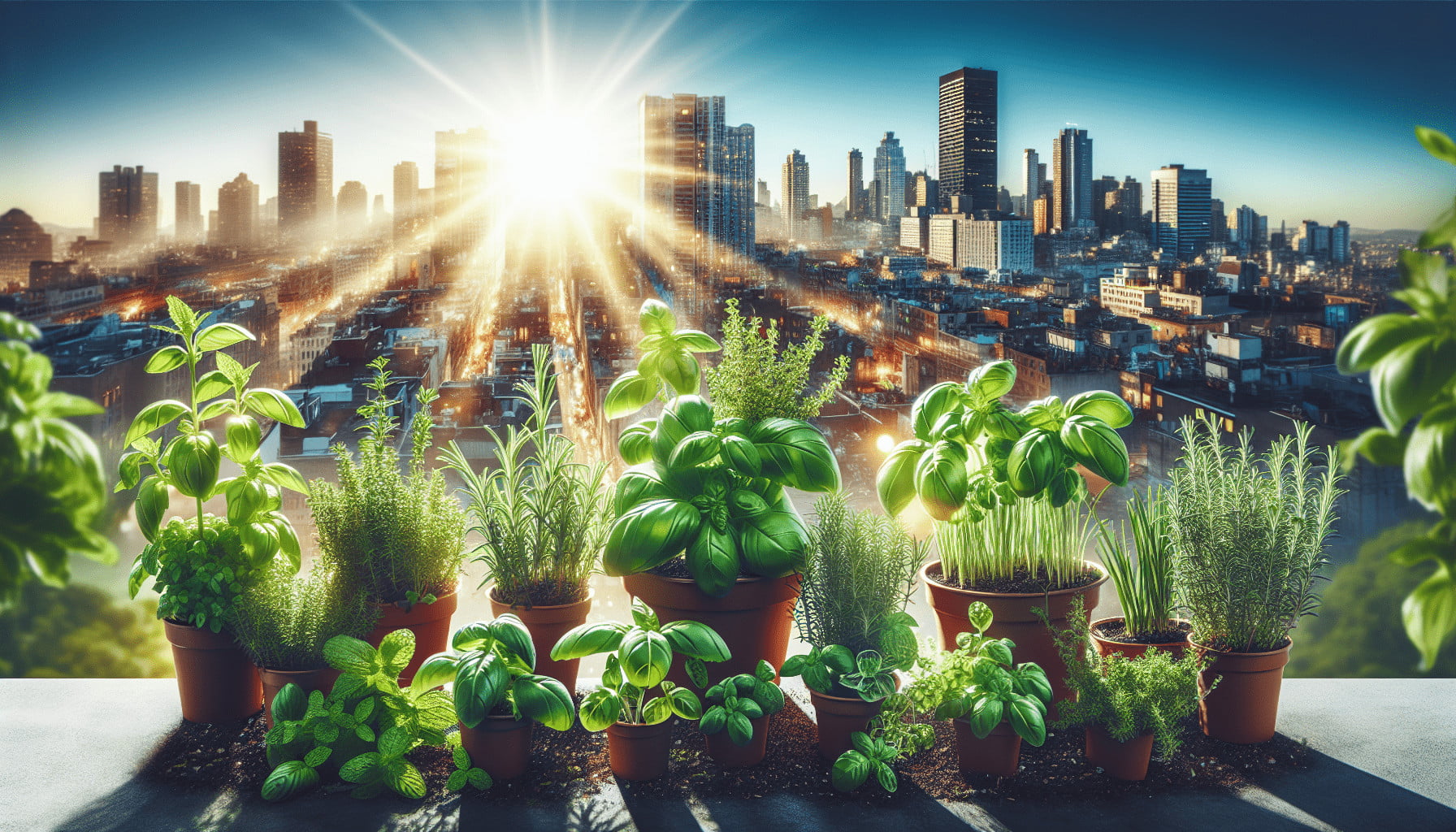Have you ever thought about starting your rooftop garden but weren’t sure where to start? In this article, we will discuss the top 10 herbs to grow on your rooftop garden. These herbs not only add beauty to your space but are also practical and can be used in cooking, aromatherapy, and even medicinal purposes. Let’s get started on creating your own herb oasis!

The Benefits of Growing Herbs on Your Rooftop Garden
Growing herbs on your rooftop garden can bring a multitude of benefits. Not only are they easy to care for, but they also provide fresh and flavorful ingredients for your culinary creations. By growing herbs on your rooftop garden, you can enjoy the convenience of having fresh herbs right at your fingertips. Plus, cultivating herbs can also attract beneficial insects to your garden, promoting a healthy ecosystem.
Efficient Use of Space
One of the main advantages of rooftop gardening is its efficient use of space. Since rooftops are often limited in size, growing herbs in containers or raised beds allows you to maximize every inch of space available. With the right planning and organization, you can grow a variety of herbs in a small area, providing you with a bountiful herb garden without taking up too much space.
Access to Fresh Herbs
Having a rooftop garden means you have immediate access to fresh herbs whenever you need them. Instead of making a trip to the grocery store, you can simply step outside and harvest the herbs you need for your dishes. This not only saves you time and money but also ensures that you are using the freshest ingredients possible in your cooking.
Sustainable Gardening Practice
Rooftop gardening is a sustainable practice that helps to reduce carbon footprint and promote environmental conservation. By growing your herbs on your rooftop, you are utilizing underutilized space and reducing the demand for commercially grown herbs that require transportation, packaging, and storage. Additionally, rooftop gardens can help to reduce urban heat island effect, improve air quality, and provide habitat for birds and other wildlife.
Top 10 Herbs to Grow on Your Rooftop Garden
Now that you know the benefits of rooftop gardening, let’s dive into the top 10 herbs that are perfect for growing on your rooftop garden. These herbs are not only easy to grow but also versatile in their uses, making them an excellent addition to any rooftop garden.
1. Basil
Basil is a popular herb that is easy to grow and adds a burst of flavor to any dish. With its fragrant leaves and delicate flowers, basil is a must-have herb for your rooftop garden. Whether you’re using it in pasta sauces, salads, or pesto, basil is a versatile herb that can elevate any dish.
2. Mint
Mint is a refreshing herb that is perfect for rooftop gardens. Whether you’re growing peppermint, spearmint, or chocolate mint, mint is a low-maintenance herb that thrives in containers. Use mint leaves to make fresh mint tea, garnish desserts, or add a pop of flavor to cocktails and mocktails.
3. Rosemary
Rosemary is a woody herb with aromatic leaves that are perfect for seasoning meats, vegetables, and bread. This drought-tolerant herb loves the sun and thrives in containers, making it ideal for rooftop gardens. Rosemary is also known for its medicinal properties and is used in aromatherapy to promote relaxation and reduce stress.
4. Thyme
Thyme is a versatile herb that adds a savory touch to a wide range of dishes. This low-maintenance herb is drought-tolerant and thrives in containers, making it perfect for rooftop gardens. With its tiny leaves and delicate flowers, thyme is not only a culinary favorite but also a beautiful addition to your herb garden.
5. Parsley
Parsley is a classic herb that is commonly used as a garnish or flavoring agent in a variety of dishes. This biennial herb is easy to grow and thrives in containers, making it an excellent choice for rooftop gardens. With its curly or flat leaves and mild flavor, parsley is a versatile herb that adds freshness and color to your dishes.
6. Chives
Chives are a member of the allium family and are known for their mild onion flavor. These slender herbs are easy to grow and thrive in containers, making them an excellent choice for rooftop gardens. Use chives to garnish salads, soups, omelets, or baked potatoes for a burst of fresh flavor.
7. Cilantro
Cilantro is a popular herb in Mexican, Asian, and Middle Eastern cuisines. This annual herb is easy to grow and thrives in containers, making it a perfect addition to your rooftop garden. Cilantro leaves are used to add a bright and citrusy flavor to salsas, curries, guacamole, and salads.
8. Oregano
Oregano is a flavorful herb that is commonly used in Mediterranean and Italian cuisines. This hardy herb thrives in containers and prefers full sun, making it ideal for rooftop gardens. Use oregano to season pasta sauces, pizzas, salads, and grilled meats for an extra kick of flavor.
9. Sage
Sage is a robust herb with gray-green leaves that are used to season meats, stuffing, and roasted vegetables. This drought-tolerant herb thrives in containers and prefers well-drained soil, making it an excellent choice for rooftop gardens. Sage is also used in aromatherapy to promote mental clarity and improve memory.
10. Dill
Dill is a feathery herb with a mild and tangy flavor that is commonly used in pickles, salads, and seafood dishes. This annual herb is easy to grow and thrives in containers, making it a perfect addition to your rooftop garden. Dill also attracts beneficial insects to your garden, helping to promote a healthy ecosystem.

Tips for Growing Herbs on Your Rooftop Garden
Now that you’ve selected the herbs for your rooftop garden, here are some tips to help you grow healthy and thriving herbs in your urban oasis.
Choose the Right Containers
When growing herbs on your rooftop garden, it’s essential to choose the right containers for your plants. Opt for containers that are lightweight, durable, and have drainage holes to prevent waterlogging. Consider using self-watering containers or planters with reservoirs to help maintain consistent moisture levels in your herbs.
Provide Adequate Sunlight
Most herbs require at least 6-8 hours of direct sunlight per day to thrive. Make sure to place your herb containers in a sunny spot on your rooftop where they can receive sufficient sunlight. If your rooftop garden is shaded, consider using artificial grow lights to supplement natural sunlight and ensure your herbs receive the light they need to grow.
Water Regularly
Proper watering is essential for the growth and development of your herbs. Check the soil moisture levels regularly and water your plants when the top inch of soil feels dry to the touch. Avoid overwatering your herbs, as this can lead to root rot and other issues. Use a watering can or drip irrigation system to water your herbs gently and evenly to prevent damaging the plant roots.
Fertilize Sparingly
Herbs are relatively low-maintenance plants and don’t require frequent fertilization. Use a balanced organic fertilizer or compost tea every 4-6 weeks to provide essential nutrients to your herbs. Avoid using synthetic fertilizers, as they can harm beneficial microbes in the soil and reduce the overall health of your herbs. Follow the instructions on the fertilizer package to avoid overfeeding your plants.
Prune and Harvest Regularly
Pruning and harvesting your herbs regularly can help stimulate growth, improve air circulation, and prevent overcrowding in your containers. Use clean and sharp scissors to trim off any dead or yellowing leaves, flowers, or stems from your herbs. Harvest your herbs frequently to promote new growth and ensure a steady supply of fresh herbs for your culinary creations.
Protect Your Herbs from Pests
Keep an eye out for common pests that can damage your herbs, such as aphids, spider mites, and caterpillars. Check the underside of leaves for signs of pests and remove them manually or use natural pest control methods like neem oil or insecticidal soap to deter pests from your herbs. Consider planting companion plants like marigolds, lavender, or basil to repel pests and attract beneficial insects to your rooftop garden.
Rotate Your Herbs
To prevent soil depletion and nutrient deficiencies, rotate your herbs in different containers or locations on your rooftop garden. Replant your herbs in fresh soil every 1-2 years to provide them with the nutrients they need to thrive. Consider growing cover crops like clover or vetch during the off-season to improve soil structure, fix nitrogen, and suppress weeds in your rooftop garden.

Conclusion
Starting a rooftop garden and growing your herbs can be a rewarding and fulfilling experience. With the right selection of herbs, proper care, and attention to detail, you can create a lush and vibrant herb garden on your rooftop that will provide you with fresh and flavorful ingredients for your culinary creations. Whether you’re a seasoned gardener or a beginner, rooftop gardening offers a unique opportunity to connect with nature, promote sustainability, and enjoy the beauty of growing your herbs in an urban environment. So, roll up your sleeves, gather your gardening tools, and get ready to create your own herb oasis on your rooftop garden!


